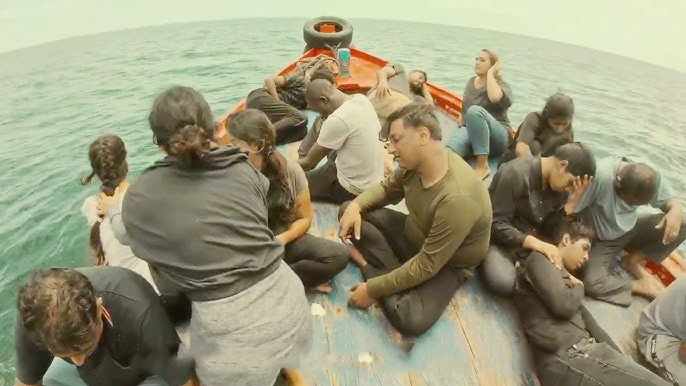A Perilous Journey | Pakistan Today

On January 2, a makeshift boat carrying 86 migrants, including 66 Pakistanis, capsized off the coast of Morocco. Only 11 survivors were rescued, leaving dozens of families devastated and dreams shattered. The dead included young men and women who had pinned their hopes on this perilous journey across the Atlantic in pursuit of a better life in Europe. This tragedy, although horrifying, is not an isolated incident. It is a grim reflection of the escalating crisis of illegal migration from Pakistan, where desperation meets exploitation, and hope often turns into tragedy.
Each year, approximately 150,000 Pakistanis attempt to leave their homeland illegally, with many embarking on treacherous routes across the Mediterranean or through the Balkans. The promise of a brighter future drives them into the clutches of human traffickers who exploit their vulnerability, charging exorbitant sums for passage on overcrowded, unsafe boats. The Atlantic route alone claimed more than 10,457 lives in 2024. Yet, for many, the hope of escape outweighs the risks, even when those risks include death.
Ultimately, the lives lost to illegal migration should not be forgotten. They must serve as a wake-up call to build a future worth staying for—a Pakistan where opportunities are abundant, education is accessible, and migration is a choice, not a necessity. With bold reforms and a commitment to justice, we can honor the dreams of those we have lost and create a nation where hope thrives, not perishes
The reality for those who survive is often just as harrowing as the journey itself. Ahmed, a 23-year-old from Punjab, recalls the horror of watching his friends drown during a boat capsize in 2023. “We were promised Europe, but we were delivered death,” he says. Ahmed now lives in Europe, undocumented and fearful. He works in gruelling conditions for less than minimum wage, unable to report mistreatment or seek legal protection. For Ahmed and countless others, survival comes at the cost of dignity, security, and basic human rights.
The motivations behind such perilous decisions are deeply rooted in Pakistan’s socio-economic struggles. Unemployment rates among youth stand at over eight percent, but the situation in rural areas is far worse, where limited access to education and job opportunities leaves young people with few options. In many families, the responsibility of financial support falls on the eldest son, and migration becomes the only perceived solution. Parents sell land, take on crippling loans, or exhaust their savings to fund these dangerous journeys, often unaware of the true risks involved.
Pakistanis contribute over $27 billion annually in remittances, a significant lifeline for the country’s fragile economy. This dependency on remittances perpetuates the belief that migration is the only viable path to success. However, what goes unnoticed are the countless families left in ruin when these journeys fail. Many return home broken— physically, emotionally, and financially— while others never return at all, leaving their loved ones in a limbo of grief and poverty.
The conditions faced by these migrants are inhumane. Boats designed for 20 people carry up to 80, often with insufficient food, water, or life vests. Those who survive the sea often endure torture, starvation, and extortion at the hands of traffickers during land crossings. Women and children are particularly vulnerable, facing abuse and exploitation. A 2023 UN report revealed that over 80 percent of migrants attempting to cross the Mediterranean experience violence or trafficking.
The cost of illegal migration extends beyond individual lives— it impacts entire communities and the nation as a whole. Families left behind often spiral into debt, especially when they have sold assets to fund these journeys. Women bear the brunt of this fallout, forced to repay loans while managing households alone. This financial strain exacerbates gender inequality and perpetuates cycles of dependency. Empowering women through education and employment could break this cycle. Research shows that countries with higher female workforce participation experience stronger economic growth and lower migration rates.
Internationally, other nations offer lessons in addressing these challenges. Portugal, for instance, implemented regularization policies for undocumented workers, allowing them to contribute legally to the economy. Poland reduced youth emigration by investing in rural development and vocational training. Pakistan can adopt similar approaches to tackle the root causes of illegal migration.
However, tackling this crisis requires more than economic solutions. Human traffickers must be brought to justice, and families forcing their children into illegal migration should face accountability. Awareness campaigns highlighting the dangers of these journeys must reach every corner of the country. Helplines and community groups should be established to provide support to those coerced into migration. Survivors, often traumatized and stigmatized, need mental health support and reintegration programs to rebuild their lives.
Empowering women is a critical part of the solution. Organizations like the Kashf Foundation have demonstrated how financial independence transforms lives. Scaling such initiatives nationwide could provide women with alternatives to migration, reduce economic pressures on families, and contribute to the economy. Increasing female representation in the workforce and leadership positions could create a ripple effect, bringing attention to issues that predominantly affect women and fostering an inclusive culture.
Inspiring examples of women leaders like Dr Sania Nishtar highlight the transformative power of female empowerment. Through her work with Ehsaas, she has championed poverty alleviation and financial inclusion, directly addressing the root causes of migration. Figures like Malala Yousafzai remind us of the importance of education in breaking cycles of poverty and dependency. Their contributions underscore the urgent need for systemic changes that prioritize inclusion and equity.
As a nation, Pakistan must confront the harsh realities of illegal migration. It is not enough to grieve over tragedies like the January 2 capsizing— we must act to prevent them. Policies must shift from reactive to preventive, addressing the socio-economic disparities that drive migration and holding traffickers accountable. Hope should not come with a death sentence.
Ultimately, the lives lost to illegal migration should not be forgotten. They must serve as a wake-up call to build a future worth staying for— a Pakistan where opportunities are abundant, education is accessible, and migration is a choice, not a necessity. With bold reforms and a commitment to justice, we can honor the dreams of those we have lost and create a nation where hope thrives, not perishes.
Source link



